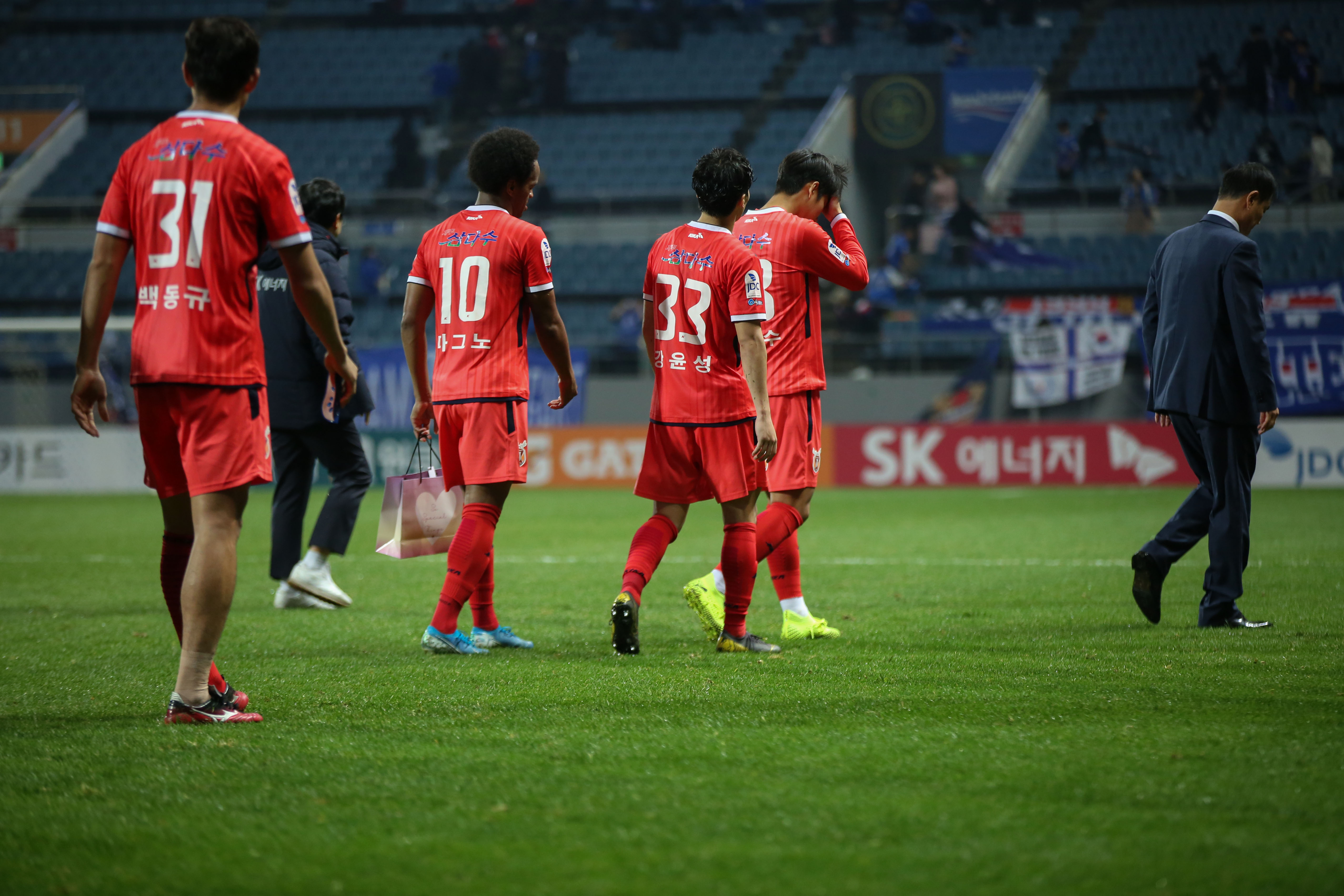The Recent Rise of Jeju United
Only 4 seasons ago, in 2019, Jeju United had their worst season in the club’s history, managing only five wins throughout the whole campaign, which saw them relegated for the first time. Since then, they have seen a meteoric rise in both stature and league positioning. But what and who are the catalysts for such a rapid transformation? Guest columnist Charlie Beasley charts their recent rise.
Pre-2019 Highs
Since the introduction of the K League 2 in 2013, and the reformation of the K League 1 to a 12-team league format, Jeju had proven themselves to be a solid side, with no threat of relegation; finishing as runners-up in 2017. The following year, in 2018, they managed a 5th place finish, accumulating 54 points, a 12-point drop from 2017. However, even with such a great points differential, things didn’t appear bleak. So, what went wrong?
Despair in 2018
Heading into the 2019 season, Jeju made the decision to retain Cho Sung-hwan as their head coach, despite a torrid September. 15 matches without a win, and to keep your position in charge, Cho must have known of his fortune. Even though he guided his side to a top-half finish, the long stretches of poor form were simply not good enough for a club like Jeju.
2019, A Season to Forget
Predictions, pre-2019, saw many believe Jeju would be back, fighting for an ACL spot, but no wins in their first nine league matches, saw Cho hand in his resignation. Cho’s successor, Choi Yun-kyum, won his debut match against Gyeongnam, however, there was little faith in him to steady the ship, and to turn this woeful form around.
Conceding 72 goals in the 2019 campaign was by far and away the worst defensive record in the K League 1; Gyeongnam had the 2nd leakiest defensive record as they conceded 61. Of those 72, the most shameful would be the back-to-back humiliations in front of their own fans by Ulsan Hyundai and Sangju Sangmu (now known as Gimcheon Sangmu). 9 goals conceded in back-to-back home games, 0-5 to Ulsan and 4-1 to Sangju, is evidence of a significant lack of characters, leaders, and a backbone.
As the 2019 season progressed, it became more apparent how unhappy players truly were. A complete lack of fight was shown, almost as if they lost their matches before the first whistle.
The Promising Signs of 2020
After the 2019 season, Jeju acted quickly, hiring Nam Ki-il on December 26th.
Nam, who is no stranger to Jeju, started his playing career here. Formerly known as Bucheon SK, Nam made his professional debut for the Island club in 1997, playing an active role until his departure in 2003. After spending the best part of six years here, it’s reasonable to say he understands the club’s philosophy more than anyone.
Nam boasts his one K League record, as he has been promoted from K League 2 more than any other manager. He achieved this feat after being promoted with Gwangju in 2014, and Seongnam in 2018. Therefore, after being relegated for the first time in their history, it seemed fitting that Jeju hire the most successful K League 2 manager.
Nam’s play style is attractive, strong forward pressure. His teams always play on the front foot and love a good on-field battle; something Jeju failed to show in their 2019 campaign. This radical change of play style from 2019 was a wake up call to the players and to the competing K League 2 teams.
However, the changes were not strictly on-field. The completion of the 2019 season saw Nam Ki-il hired as manager, but also a change of CEO and replacement of existing coaching staff and rehabilitation members. This overhaul proved to be greatly beneficial to Jeju, as a change in mentality on and off the pitch was the boost they needed to be back in the K League 1.
Nam’s Jeju revolution saw them crowned as champions with 60 points, six points clear of Suwon FC, who gained promotion through their play-off victory.
Jeju’s Jubilations
The return of Jeju to the K League 1 was a demand from fans, and Nam successfully guided them to the top division once again.
2021 saw a drastic improvement from Jeju compared to their previous stint in the K League 1. Not only did they survive and keep their place in the top division, but Jeju were agonisingly close to qualifying for the Asian Champions League in their first season back in the top flight; a position the club is more accustomed to.
2022, very similar to that of 2021. The Tangerines narrowly missed out on ACL football once again, this time finishing just two points behind Incheon United. After two promising K League 1 seasons under Nam Ki-il, Jeju will be aiming for at least one better for 2023, and their primary goal; attaining ACL qualification. The boys in orange are more than capable of doing such, and with the recent addition of Yuri Jonathan, a €175,000 signing from Liga Portugal 2 side CF Estrela, Jeju could potentially be one of the teams to keep a keen eye on this upcoming campaign, especially with their added firepower up front.
Jeju’s opening fixture for the 2023 season is at home to Suwon FC on February 26th, a match they will be heading into feeling confident of obtaining 3 points.










![[about]](https://blogger.googleusercontent.com/img/b/R29vZ2xl/AVvXsEh0mXcKy7h0fXIgdvWFm5DpFfwXkPr2ggzUt9_AoPo8vS0HOsFMT8KsO21qTLZBKoLyQXSOAckzy4OtJCPOoHtL5cGqAa0zXKzIdiW45D6TCFAisfJUODssBTfrkat95GXhJc8haWSP3nyV/s1600/KLU.png)
No comments:
Post a Comment